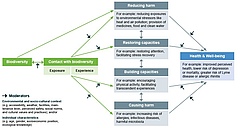Why biological diversity is important for our health

Urban parks and their biological diversity contribute to our health and wellbeing, e.g. by reducing our stress level. (Picture: Foto: Stefan Bernhardt)

Conceptual model detailing the pathways linking biodiversity to human health and well-being. (Picture: Graphic by the authors)
Biodiversity contributes to human health via four domains of pathways – both beneficial and harmful
Report by first author Dr Melissa Marselle, former post-doctoral researcher at UFZ/iDiv, and senior author Prof Aletta Bonn, head of ecosystem services lab at UFZ/iDiv/FSU.
Leipzig. Biodiversity has a major impact on human well-being - in four different ways: by reducing harm, restoring capacities, building capacities and causing harm. This is the result of a team of 26 international experts from various disciplines, led by the Helmholtz Centre for Environmental Research (UFZ), the German Centre for Integrative Biodiversity Research (iDiv), as well as Friedrich Schiller University Jena (FSU). The study was recently published in the journal Environment International.
We all know that biodiversity is essential for our health and wellbeing. But why and how is biodiversity important for our health? What are the different beneficial and harmful effects of biodiversity on health? Researchers identified four different pathways how biodiversity affects human health, both positively and negatively, by (i) reducing harm (e.g. provision of medicines, decreasing exposure to air and noise pollution); (ii) restoring capacities (e.g. attention restoration, stress reduction); (iii) building capacities (e.g. promoting physical activity, transcendent experiences); and (iv) causing harm (e.g. dangerous wildlife, infectious diseases, allergens).
Biodiversity crucially contributes to human health by reducing harm. It provides us with medicines, food, as well as climate and water regulation, biodiversity protects us from diseases and enhances health. Biodiversity can also foster human health and wellbeing by reducing harm from environmental stressors, such as air and noise pollution, or by reducing exposure to extreme heat.
Biodiversity also contributes to our mental health by restoring our capacities to deal with the demands of everyday life. Everyday life can stretch our ability to handle stress, focus our attention and solve problems, which puts us at risk of being stressed and mentally ill. Biodiverse environments can help us restore these depleted capacities. Studies have shown that greater plant species richness and bird abundances can reduce stress. Biodiversity may also help us restore the capacity to concentrate or focus our attention.
In addition, biodiversity also fosters human health by building our capacities for meeting everyday demands. For example, people may be more likely to take exercise in a biodiverse environment. Biodiverse environments may also facilitate transcendent experiences – such as experiencing awe and wonder or reflecting on one’s life goals. These transcendent experiences are important contributors to health and wellbeing. Viewing and listening to wildlife can also contribute to a sense of place attachment and place identity.
Biodiversity can, however, also affect human health by causing harm. The COVID-19 pandemic has highlighted the negative impacts biodiversity can have on human health. Exposure to infectious zoonotic diseases, such as COVID-19, Ebola or Malaria, transmitted through animals can form significant health risks. Unsustainable management of biodiversity (e.g. through habitat loss or wildlife trade) can increase the risk of interactions with animals that carry these infectious diseases. Allergies and animal attacks are other examples of how contact with biodiversity may also be harmful to human health.
Our findings further the understanding of the specific pathways of how biodiversity is important for our health. We hope this can underpin the urgency of why we need to protect nature for our own health and well-being.
The study, funded by the Volkswagen Foundation, forms the synthesis result of a 3-day symposium in September 2019 with an international panel of 26 experts from different disciplines, including biology, biomedical sciences, ecology, environmental epidemiology, environmental psychology, geography, medicine, modern literature, public health, and statistics, as well as experts from conservation agencies and health authorities.
By synthesizing the evidence linking biodiversity to human health with interdisciplinary colleagues from health sciences, psychology and natural sciences as well as experts form policy and practice we could develop a holistic, conceptual biodiversity – health framework. Understanding these causal relationships will provide important pointers for future research as well as for practical implementations in urban planning and developing public health policies for investment into biodiversity as our life-support system.
Melissa Marselle
Original publication:
(Scientists with iDiv affiliation bold)
Marselle, M.R., Hartig, T., Cox, D.T.C., de Bell, S., Knapp, S., Lindley, S., Triguero-Mas, M., Böhning-Gaese, K., Braubach, M., Cook, P.A., de Vries, S., Heintz-Buschart, A.,Hofmann, M., Irvine, K.N., Kabisch, N., Kolek, F., Kraemer, R., Markevych, I., Martens, D., Müller, R., Nieuwenhuijsen, M., Potts, J.M., Stadler, J., Walton, S., Warber, S.L. & Bonn, A. (2021) Pathways linking biodiversity to human health: A conceptual framework. Environment International, 150, 106420. DOI: 10.1016/j.envint.2021.106420
Contact:
Dr Melissa Marselle
Helmholtz Centre for Environmental Research – UFZ
German Centre for Integrative Biodiversity Research (iDiv) Halle-Jena-Leipzig
Now: Institute for Psychological Sciences
De Montfort University Leicester, UK
United Kingdom
Phone: +49 341 9733151
Email: melissa.marselle@dmu.ac.uk
Web: www.dmu.ac.uk/about-dmu/academic-staff/health-and-life-sciences/melissa-marselle/melissa-marselle.aspx
Prof Dr Aletta Bonn
Head of Department Ecosystem Services
Helmholtz Centre for Environmental Research (UFZ)
German Centre for Integrative Biodiversity Research (iDiv) Halle-Jena-Leipzig
Friedrich Schiller University Jena
Phone: +49 341 9733153
Email: aletta.bonn@idiv.de
Web: www.idiv.de/en/groups_and_people/employees/details/137.html
Sebastian Tilch
Media and Communications
German Centre for Integrative Biodiversity Research (iDiv) Halle-Jena-Leipzig
Phone: +49 341 97 33197
Email: sebastian.tilch@idiv.de
Web: www.idiv.de/en/media
